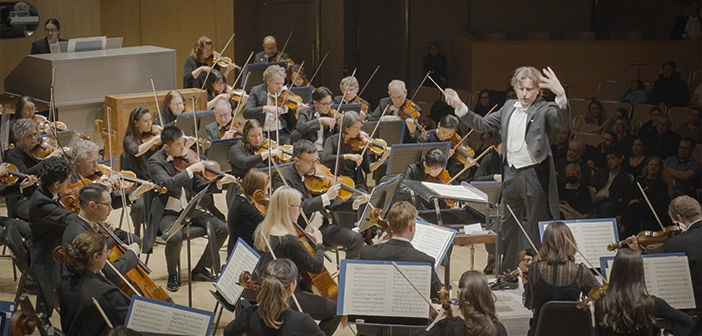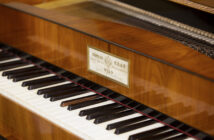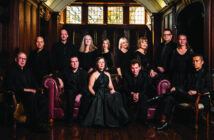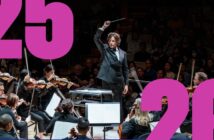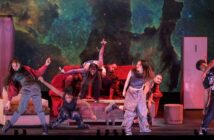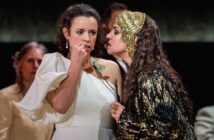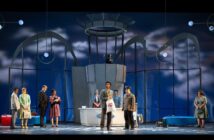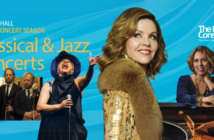Those wondering whether enjoyment of classical music is on the rise or wane might look to the Toronto Symphony Orchestra’s live and recorded output. Their home venue (Roy Thomson Hall, in downtown Toronto) fills up regularly for live performances. Philanthropic generosity flows – the TSO has recently named Mary Beck as Patron in Perpetuity for her generous and longstanding support. The TSO orchestra members appear to be enjoying the effects of their community outreach, and the widening audience experience. In brief, Toronto loves the TSO.
It is within this context that Maestro Gustavo Gimeno, a visionary, opened this week’s all-orchestra concert intertwining sounds and imagery. Gimeno began by addressing the audience with some pointers on what to expect during the evening’s program, titled Pines of Rome. The stylistically diverse works had been carefully chosen to blend familiar with unfamiliar, simplicity with virtuosity.
The first entry, Ballet Music from Act 111 of Macbeth by Guiseppe Verdi comprises 3 movements, composed in 1847. As indicated in the program notes, “ballet was an obligatory ingredient in 19th century French grand opera.” In the words of George Balanchine, the father of America ballet, “see the music, hear the dance”. This was indisputably dance music. Picture bows leaping off stringed instruments, and hear the fanfare of winds and brass. The sum total was downright touching. Well-deserved cheers filled the hall as Maestro Gimeno acknowledged principal cellist Joseph Johnson and his section mates, among others.
The Feste Romane, composed by Ottorino Respighi in 1928-29 followed with contrasting sound effects: eerie shimmering lower strings, and the sweet sounds of the TSO’s warm-hearted concertmaster, Jonathan Crow. Eyes may have wandered to a mandolin on stage, plucked by a violin section member. Flute gave way to brass, bringing to mind images of carrousels winding through a magic kingdom. Wherever imaginations may have wandered, the resounding applause that followed confirmed appreciation for the juxtaposition and mastery of instruments, and the simplicity with which a complex score was performed.
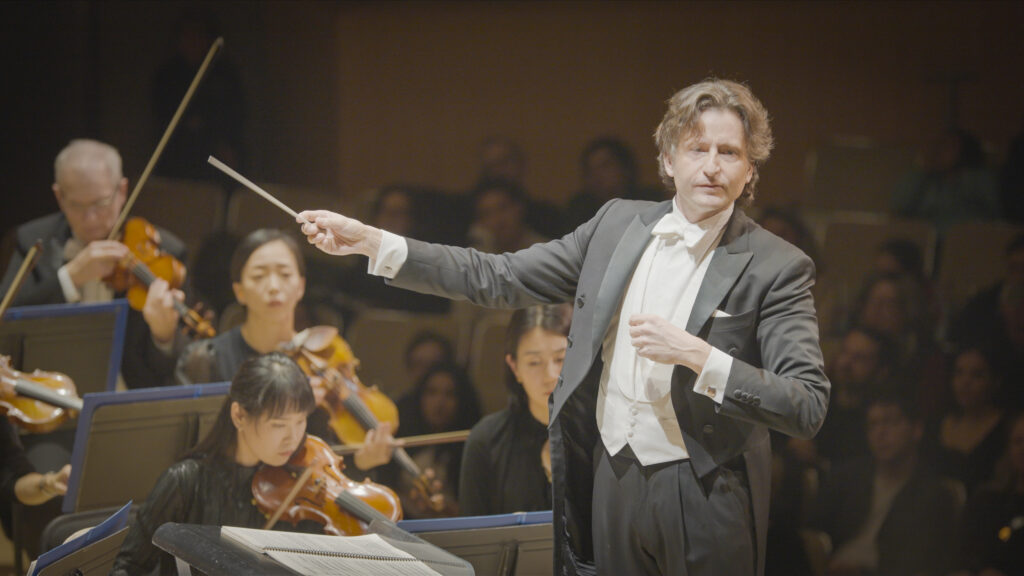
Gustavo Gimeno conducts the Toronto Symphony Orchestra in a Feb. 3 Pines of Rome concert (Photo by Allan Cabral)
4 delicaces, composed by Luciano Berio in 1978-1989, followed. Berio is well known for contributions to the field of electronic music, tonal layering, and deep knowledge of orchestration. The virtuosity of the brass and woodwinds sparkled throughout.
Nino Rota’s soundtrack for The Leopard is generally recognized as one of the greatest scores of the 20th century. The TSO program featured selections from Ballabili from Il Gattopardo (The Leopard). Snippets reminiscent of classical, folk, and square-dancing idioms were woven together seamlessly by the composer – perhaps with a touch of humour – picking up steam at a ferociously frenetic pace.
Ottorino Respighi’s Pini di Roma (Pines of Rome) P.141 is a tone poem in 4 movements. The work depicts trees in Rome, seen at different times during the day. Images of past and present are differentiated in sound by way of instrumentation. The four distinct movements are punctuated by percussion, harp, bells, celeste, piano, organ, offstage trumpet, and brass instruments. This selection showcased the virtuosity of TSO section members.
Maestro Gimeno’s well known pursuit of excellence is worthy of the acclaim he continues to garner. The TSO recording of Turangalila, recently released on Harmonia Mundi, marked the first of a long-term multi-disc relationship, extending the label’s existing relationship with Maestro Gimeno (the live performance was reviewed in the March 2023 edition of MyScena). This first recording is a TSO treasure, an essential component of every music lover’s collection, and a teaser of more to come.
Toronto Symphony Orchestra
https://tso.ca/

